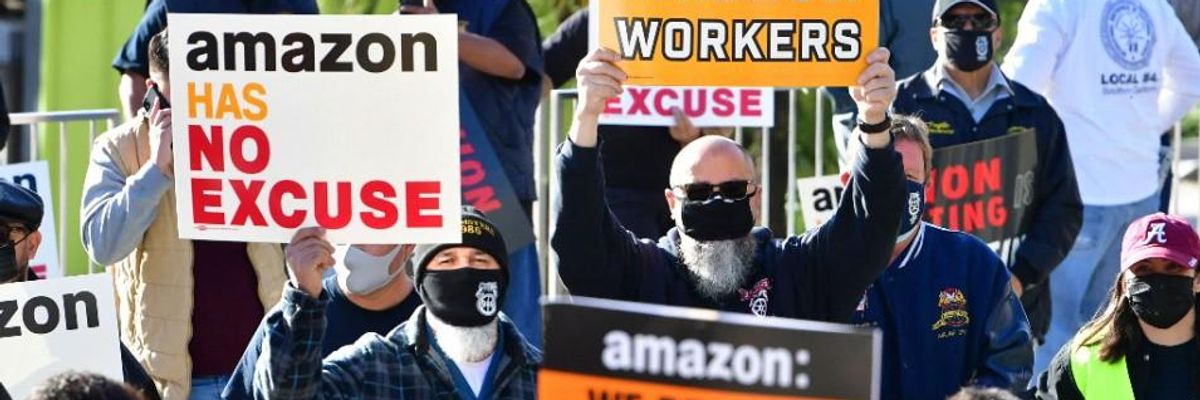Amazon's victory over an against-the-odds unionization effort at its warehouse in Bessemer, Alabama is intensifying pressure on Senate Democrats to swiftly eliminate the 60-vote legislative filibuster and pass the PRO Act, a proposed revamp of employer-friendly U.S. labor law that would ban many of the tactics the tech behemoth used to crush the organizing drive.
Endorsed by President Joe Biden and passed by the House of Representatives last month, the Protecting the Right to Organize Act (pdf) has yet to receive a vote in the upper chamber as several members of the Democratic caucus--including Sens. Joe Manchin (D-W.Va.), Angus King (I-Maine), and Kyrsten Sinema (D-Ariz.)--have yet to back the legislation.
"The Senate needs to abolish the filibuster, pass the PRO Act, and we need to tax billionaires out of existence."
--Rep. Cori Bush
But even if every Senate Democrat were to sign on, the bill would still face long odds due to the chamber's filibuster rule, which effectively requires 60 votes to pass most legislation. Five House Republicans voted for the PRO Act last month, but there is virtually no chance that at least 10 Senate Republicans would be willing to do the same given the party's hostility to organized labor.
That leaves elimination of the filibuster--which can be done with a simple-majority vote--as the best way to ensure final approval of legislation that would go a long way toward reversing the damage inflicted by the decades-long assault on unions by corporations and their allies in government. To abolish the filibuster, Senate Democrats will need to win over Manchin and Sinema, both of whom have publicly voiced opposition to abolishing or weakening the rule.
"Unions put power into the hands of workers and are key to good wages, fair benefits, and an equal voice on the job," tweeted Rep. Pramila Jayapal (D-Wash.), chair of the Congressional Progressive Caucus (CPC). "It's time to eliminate the filibuster, pass the PRO Act, and guarantee the right to organize."
Rep. Cori Bush (D-Mo.), a CPC member, added that Amazon CEO "Jeff Bezos is the richest man in the world. He invested millions of dollars to keep these workers from unionizing. He thinks he's untouchable."
"The Senate needs to abolish the filibuster, pass the PRO Act, and we need to tax billionaires out of existence," said Bush.
The renewed urgency behind the PRO Act comes after an initial tally found that 1,798 workers at Amazon's Bessemer facility cast ballots against forming a union while just 738 voted in support, a likely decisive blow against an organizing push that drew national attention and the backing of prominent progressive lawmakers, including Sen. Bernie Sanders (I-Vt.).
The Retail, Wholesale, and Department Store Union (RWDSU), which attempted to organize the nearly 6,000 Bessemer workers, said Friday that it is formally filing unfair labor practice charges against Amazon, accusing the corporate giant of "lies, deception, and illegal activities."
But while some of Amazon's conduct may have been illegal--RWDSU has pointed specifically to the company's work with the U.S. Postal Service to install a ballot drop box on warehouse property--organizers have noted that many of the company's aggressive tactics were permissible under current U.S. labor law, underscoring the extent to which the deck is stacked against workers who want to form a union.
As Jacobin's Alex Press wrote Friday:
After RWDSU filed for an NLRB election in November of 2020, Amazon held "captive audience meetings," mandatory sessions where workers heard management tell them why they shouldn't unionize. Managers lie in these meetings, and the ones in Bessemer are no exceptions. The company texted workers several times a day to urge them to vote no. They papered the facility's bathroom stalls with anti-union flyers. They outfitted temp workers, ineligible for the union but especially vulnerable to management pressure, with 'vote no' swag, ensuring they'd serve as walking anti-union propaganda on the shop floor.
These are standard anti-union tactics, if amped up thanks to Amazon's effectively infinite coffers. All of this is permitted under U.S. law. And even if the company broke the law during the union drive, that is to be expected--given how nonexistent the repercussions are for violating workers' rights, around 40 percent of employers are charged with violating federal law during a union election.
Roxana Rivera, vice president of 32BJ SEIU, the largest union of property service workers in the U.S., said in a statement late Friday that "we have seen many companies employ the kind of union-busting tactics employed by Amazon in Bessemer."
"From changing traffic lights to captive audience meetings, this corporate giant spent millions of dollars against workers, instead of on workers," said Rivera. "Because companies use their outsized power to stop at nothing to prevent workers from coming together, Congress must act to make it easier for all workers to join unions by passing the Protecting the Right to Organize (PRO) Act."
"In most states, it is easier to buy an AR-15 than it is to join a union," Rivera added. "The PRO Act would put a stop to many of the tactics Amazon used to suppress the union organizing efforts of its workforce. Workers will not be deterred and will continue to organize for a better future."
Biden, who spoke out in support of Bessemer workers in late February, included the PRO Act in his roughly $2.3 trillion infrastructure proposal, but the labor measure is not likely to survive the filibuster-proof budget reconciliation process--a restrictive procedural tool Democrats will likely use to pass an infrastructure package amid unified Republican opposition.
As Noah Lanard of Mother Jonesput it Friday, the PRO Act "stands little chance of becoming law as long as the Senate filibuster remains in place."

